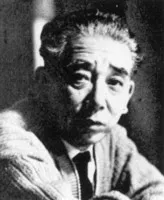Today, July 25th, in 1977 Akimoto Fujio died. This is the memorial day for him (不死男忌, fujio ki). The Chinese characters of his name 不死男 (Fujio) mean, “an undying man.” The name was fitting, as we shall see.

He was born Higashi Kyōzō on 3 Nov 1901. He favored the gendai haiku school, which sought to reform haiku for the modern era, doing away with both the strict syllable count and the nature theme. Within this school of haiku, he joined the New Rising Haiku movement(shinkō haiku undō) which was the most radical of the gendai haiku poets. The most powerful man in the haiku world, the very conservative Kyoshi Takayama, hated this group, thinking they were destroying haiku.
Many of the shinkō haiku community were pacifists and wrote haiku that could be interpreted as anti-war. Kyoshi saw his chance and worked with the secret police to have them arrested. Some modern writers go further, saying that Kyoshi persecuted the poets by using the secret police. Whatever the level of his involvement was, the result was that many, including Akimoto, were arrested. This would become known as the Haiku Persecution Incident.
In prison, they were beaten and tortured. Akimoto would later write "During wartime, many people were inflicted with wounds. The wound I received, which was inflicted by the Haiku Persecution Incident, was merely ‘a lump.’ Even though it was but ‘a lump,’ I will never forget its pain."
He wrote 172 haiku would in prison. He would write them with a small piece of chalk, erase and rewrite until he had memorized them. After he was released from prison, he published them. When his book was released, he changed his name to Fujio—an undying man.
After he was released he wrote:
獄を出て触れし枯木と聖き妻
goku o dete fureshi kareki to kiyoki tsuma
out of prison
i touched a dead tree
and my saint wife
